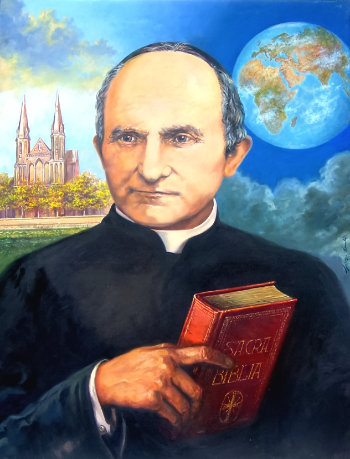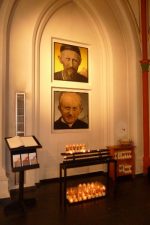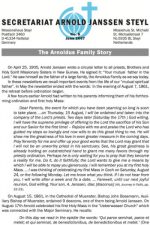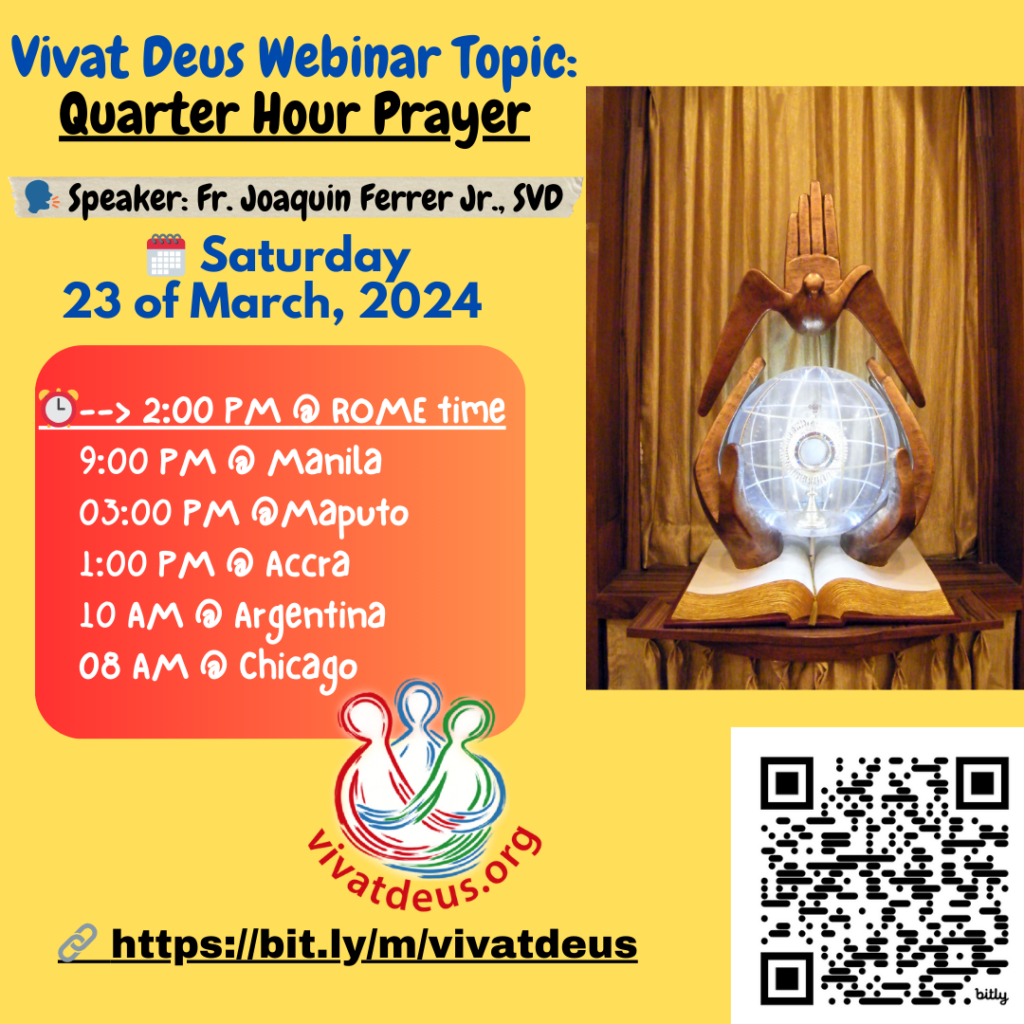Arnold Janssen (1837-1909)
Janssen Who?
The canonisation of Arnold Janssen together with Joseph Freinademetz, the first missionary he sent to China, is scheduled for 5th Oct. 2003. Apparently, he does not have much of a claim to fame. He was not an Augustine who went through a great conversion experience, nor a Francis Assisi who stood out in his times as an icon of poverty and simplicity, nor an Ignatius of Loyola who defended the Church against the onslaught of Reformation, nor a Padre Pio who had stigmata as a trade mark of sanctity, nor a Maximillian Kolbe, who sacrificed his life for the sake of his friends (Jn.13: 15). He is not even like Mother Teresa who is acknowledged the world over as the Saint of the Gutters, even before she is beatified. There is a ‘Janssen who?’ question in the air. Then why canonise him?
Pamela, a girl from the Philippines fondly calls Arnold Janssen ‘Papa Arnold’. She would not go to bed each day without thanking him and wishing her ‘Papa’ good night. Why? Because after she met with an accident on 2nd Jan. 1995, she had sustained fatal brain injuries and the doctors had written her off as a totally hopeless case. She attributes the miraculous healing and her complete recovery to his intercession in heaven. So there seems to be something extraordinary about this ordinary man. What is unusual about him?
The Man-Janssen
In a small town called Goch in Germany, close to the Dutch border, lived Gerhard Janssen (1801-1870). He married Katherine Wellesen (1809-91) from the nearby parish in 1834. This simple couple tried to raise a family with the meagre income of their little farm supplementing it with hauling freight until railroad appeared on the scene. Obviously there wasn’t any blue blood in his lineage.
Praying the Bible, especially the Prologue of John’s Gospel was almost a daily practice particularly in times of illness or tribulation. Three years after entering matrimony they were blessed with a son whom they named Arnold. The boy was born with blonde hair, brown eyes and a prominent nose, many of his facial features closely resembling his mother’s. His voice was high-pitched and not very resonant. Hence singing and music was not his cup of tea. In the scheme of Providence, he was the one destined to become the Father of Arnoldus Missionary Family consisting of three religious congregations. Out of ten children born to his parents seven of them survived infancy. His two siblings became religious – one a Capuchin brother and the other an SVD priest.
The traits of Arnold’s character have been well known among his contemporaries and close associates. They often considered him to be a strict disciplinarian, industrious, unyielding on principles, having courage of conviction and faithful in the life of prayer. Most of these he had inherited from senior Janssen who definitely left a deep impression on him as a young lad. Despite being generally considered inflexible he had his own ways of showing kindness to others. He maintained good relations with those who left and those who were dismissed from the society.
Though, in his own words, he was not a brilliant student in school Arnold cleared all exams of the Royal Board of Examiners in Muenster with a ‘satisfactory’ grade. He had special interest in natural science. When he was a student at Bonn University his essay on “Plant Formations” was awarded a prize. But mathematics was his favourite and called it his ‘beloved subject’. He had once won a contest to solve a complex mathematical problem.
Over the years he developed some capacity for learning modern languages of the neighboring countries like French and English. His interest in literature led him to study some of Shakespeare’s plays. Besides being qualified to teach these as subjects in school he acquired some proficiency over Hebrew as well. Spanish, he learned by himself when need arose to prepare the future sister missionaries for South America.
Arnold started his priestly life (ordained in 1861) as a conscientious school teacher. He displayed organizing ability, capacity to take risks, and leadership qualities. There was even streak of marketing in him. He was a man who made use of the avenues for growing up. In the words of William Gier (SVD Superior General from 1920 to32) he was a man who constantly grew up: “If we compare Arnold Janssen in 1880 or 1890 with the Founder of 1900 and afterwards, we cannot recognize him any more.”
His Profound Spiritual Legacy
Trust in the power of prayer was in his genes, so to say. Even as a young priest addressing the German Catholic Congress in 1869 he asserted: “Christ needs our prayers and sacrifices. In turn our prayers and sacrifices have an effect of His own. We must pray for the grace of a renewal of faith in Catholic countries. We must pray that our separated brethren, not individuals only but entire nations may return to the unity of faith. We dare hope for this from God’s grace. ”
Arnold was convinced that saints are not born but gradually formed by grace as he had pointed out during a conference for the cloistered sisters. So, he was on an interior exploration. “I will find and worship God in my own heart. He is not merely present in us, he lives in us.” No wonder he composed a short prayer which he used to say every fifteen minutes in order to stay in constant communion with the Blessed Trinity.
The Gospel of John has been a spiritual fountainhead for Janssen. Meditating often upon Jn. 17: 1-26 he tried to develop a Trinitarian theology of his own. “The Father gazes on his image in the Son, and the son on his reflection in the Father, and in this vision both are aware of the infinite fullness and perfection of the Godhead; from this awareness springs a marvelously deep, ineffable love of the Father for the Son and the Son for the Father. From this love proceeds the Holy Spirit.”
The choice of the term ‘Divine’ in the name of the society was made after much reflection: “We understand the adjective ‘divine’ as referring to the three persons of the Blessed Trinity. Therefore, by Divine Word we mean the Incarnate Son, that is, the Gospel of Jesus Christ and the Word of the Holy Spirit, that is, the Sacred Scriptures in its entirety, the Word of the prophets, apostles and priests in as much as they preached under the inspiration of the Holy Spirit.”
This strong conviction about the primacy of the Word landed him in trouble too. When he submitted the draft of the Constitutions to the Sacred Congregation for approval, the censor, Domenico Serafini raised objection saying that it contained too many Biblical quotations and very little reference to Canon Law. He did not buckle under pressure. His determination won the day.
Being aware of the Sonship revealed in the Incarnate Word Janssen, at those moments of deeper intimacy with the Divine, felt that the gaze of Godhead is upon him as much as he focused his full attention on his Lord. So he said: “Just as we contemplate God, so too does he contemplate us, and the glance of his divine eye is firmly directed to our soul, penetrating it to its deepest depths.” His understanding of contemplation percolated down to the Rule he drafted for Sisters and it encompassed the moon, sun, stars, storms, mountains, rivers, valleys, animals and plants and even the elements because it is through the Word that all things were made.
In the heart of hearts Janssen was filled with a special devotion to the Holy Spirit. Being convinced that mission is the work of the Spirit he introduced singing of Veni Creator Spiritus from the time the mission seminary was started. Then later on he made a personal consecration of himself to the Holy Spirit. Exactly a year before he founded the S.Sp.S. Congregation he consecrated the whole society to the Holy Spirit.
Arnold’s Trinitarian spirituality which apparently sounds very cerebral had also a dimension of heart from where human feelings and sentiments spring. His devotion to the Blessed Sacrament and the Sacred Heart should be seen as a vital link that connects the Word with some of the deeper spiritual sentiments hidden in human heart. “The Eternal Word was not content to love us as God. He wanted to love us also in an assumed humanity in the Sacred Heart of Jesus. This great love manifested continua11y in the Blessed Sacrament and enduring for all eternity is the sun of the Spiritual life.” (Arnold Janssen’s Spirituality for our Times, p. 183)
Janssen did not believe perpetuating rigorous ascetical discipline as a part of spirituality for its own sake. His approach was more down to earth. While drafting the rules for the cloistered sisters he once told them: “I do not prescribe for you any special ascetical practices. You will have enough of them in your daily community life.” What an insight into the human dimension of cloistered life!
A Comprehensive Missionary Vision
Unlike the common impression among many people Janssen had a very broad understanding of mission. He was not just another hard core advocate of proselytization. In hindsight it can be said that his vision was very close to that of the Papal Encyclical Evangelium Nuntiandi. Renewal of Catholic faith was as important as preaching the Gospel to non-Christians in distant lands. He became a zealous promoter of apostleship of prayer in order to address this need. Renewal is possible only by receiving Grace. It is through prayer this Grace is obtained. His initiatives to promote devotions were directed towards the renewal of faith. Proper instruction in doctrines was considered an essential component of keeping up faith. Entering into the field of publishing Catholic literature was with the intent to reach out a larger audience with the basics of genuine Catholic teaching.
Praying and working for the unity of all Christians is an integral part of evangelization. During the historic address at Catholic Congress his words sounded like that of a prophet. “Gentlemen, imagine for a moment that ancient and proud England, with its world-wide dominions, were a young Catholic country, full of zeal and joy in the possession of its new-found faith and the treasures of salvation. How that would renew the face of the earth! Therefore, we must pray for a rebirth of the faith in those countries that became Christian long ago. If they suffer shipwreck of their faith, we must reckon with the possibility that God may transfer his favor to the pagan world.” A hundred years later he has been proved to be right as Christianity does not seem to make sense to the vast majority of people in Western Europe.
His missionary vision was not narrowed down to Europe only uppermost in his mind. He wanted the Word to be made known where it has not been preached. So, the great land of China was uppermost on his mind. The first missionaries were sent to another continent in order to spread the Good News as has been requested by the Prefect Apostolic Raimondi of Hong Kong. In his own lifetime he was able to see how this mission yielded much result. On his 70th birthday the then Bishop of South Shantung (Henninghaus) during the speech of felicitation said that he was greeting Janssen in the name of 40000 Chinese Christians who owed the gift of faith to him with as many catechumens who were on the way to embrace faith.
The secondary purpose of founding the congregation was for the promotion of sciences. Keeping this ideal in mind he drew up a broad outline to integrate it into the foundational charism. The rationale for this emphasis was the need to cultivate a spirit of scientific quest in the houses of studies in Europe and schools in mission. He was convinced that the Church would not be able to win the minds of men and retain their allegiance unless she is a leader in secular knowledge and simultaneously sincere piety as well as apostolic zeal. So, he found in the talents of Wilhelm Schmidt that his dream could be realized in the field of ethnology.
Janssen was a zealous promoter of publications on Christian devotions and doctrine. He was convinced of the vast reach of the printed word as he used to say: “The spoken word vanishes, the printed word remains. Good books can reach places to which no sermon would ever penetrate.” Inaugurating the press at Steyl in 1876 Janssen had said that in Jesus’ time the printed word was unknown, but it is known in times. Therefore, the servants of Jesus must also use it in order to do good.” Knowing about the reach and impact of the written word he published a number of booklets modern and manuals. The combined circulation of these had crossed 400000 copies in a short time.
The Father or a Family
“If nobody else does it, do it yourself”, were the words of Prefect Apostolic Raimondi of Hong Kong which clinched the decision of starting the mission seminary in Steyl. This great event took place on the Nativity of the Blessed Virgin Mary in 1875. Nearly a year later Janssen and his companion, Anzer pronounced their first vows on 16th June, the feast of the Sacred Heart. At that moment he was not fully aware of the future significance of this act. But in fact, he was laying the corner stone for the religious family he would eventually build up.
The idea of establishing a mission seminary slowly got evolved into founding a missionary society. When it came to naming the institute that too had some hurdles to cross. Janssen had wanted the infant congregation to be christened as ‘Society of the Divine Word’. But Cardinal Sattoli, the then Prefect of Propaganda Fide, tried to drive spokes into his plan. Call it ‘Society of the Adorers of the Divine Word’, he had ruled at first. Janssen then argued that the Word was the proto missionary. Further, there was already a Congregation for the Most Holy Trinity, a Society of Jesus, a Congregation of the Holy Redeemer. On the face of his sound theological argument the Cardinal could not sustain the earlier objections anymore. Finally, His Eminence yielded, albeit with the intervention of the Holy Office.
Adding the branch of Lay Brothers was the next development in the little family. The press attached to the seminary was in need of dedicated work men to bring out quality publications and also to meet the deadline of print orders. Having clerics on all these jobs would not provide a satisfactory solution. Employing lay people too has its limitations, he reckoned. Then he hit upon the idea of recruiting candidates for brotherhood. In 1877 the first applications reached him. Then onwards there was a steady flow of candidates. These unassuming, austere hard working and devout men eventually became the backbone of his press apostolate. Besides manning the machines in the press many of them, like foot soldiers, went from door to door in German speaking countries, getting subscribers for mission publications.
Special emphasis was laid right from the beginning to maintain an international character in the family. On this score Janssen was uncompromising and had expressed his views quite clearly to the Prefect of Propaganda: “I believe that we will not succeed unless we found a religious congregation. But I am reluctant to multiply such Societies, especially one with a national character – which today so often is the enemy of God.”
His deed matched his words. The first community which was constituted of four members hailed from as many different national/ethnic backgrounds. He stood his ground even on the face of two of them deciding to quit, apparently on this score. In his zeal to retain this precious trait in the missionary family he often admonished the members to guard against false national pride. Cherishing this ideal made it easier for the society to start the mission among African Americans in the USA and even pioneer recruitment of candidates for priesthood.
The next addition to the family, after the Brothers, was the branch of sisters. The first missionaries to China reported to Janssen that missionary sisters would be able to give proper training to housewives as the local custom forbade priests to instruct women. Elsewhere too their services would be in great demand to run orphanages and schools for girls. Maria Stollenwerk and her companions who came with the intention of becoming missionaries but were helping out in the kitchen of the seminary, after a long period of testing their vocation, were admitted as the first candidates of Sisters Servants of the Holy Spirit (S.Sp.S.).
Janssen had a farsighted missionary vision for the sisters. He realized that as nurses they would do an excellent job in mission countries. Taking care of the sick was one of the traditional services they rendered as part of the medical profession. But sisters practicing midwifery? Well, over a hundred years ago it was practically unheard of. So in the interest of mission he made an all-out effort to obtain special permission from Vatican. And that bore fruit. A quiet way of sowing the seeds to empower women without saying it so many words!
Without the power of prayer there won’t be much fruit for the labor of the missionary in the Master’s vineyard. That was Janssen’s one of the core convictions. From among the first community of sisters he had earmarked some of them to keep up round-the-clock adoration of the Blessed Sacrament. In 1896 a full separation of this group was made and thus the congregation S.Sp.S. sisters of Perpetual Adoration came into existence under the rule of cloister. Although less numerous that was the last of the three children to be born from the paternity of Janssen.
Janssen – a Man Ahead of His Times
In many respects Janssen was a man ahead of his times. The changes that took place in the Church during the past fifty or sixty years amplify this point. The secondary objective of starting the society was to promote sciences. For him there was no strict separation between the secular and sacred. In incarnation, he saw, the meeting of the Divine and the human, the sacred with the secular. Science and religion have common meeting ground as the Word is present in human life, in every living being, in every creature, in the whole universe and it is through the Word that everything has been created. Hence developing a philosophy as well as critique of science – a felt need of our times – would be quite in keeping with his vision of promoting higher academic pursuits.
The Spirit in Janssen soared high. Although he believed in converting pagans he did not look down upon them as objects, but as subjects with a dignity of their own and he respected the ethnic identity. Missionaries were told to esteem the culture of the people whether they were sent to Black, White, Brown or Yellow race. The attitude provides the basis to develop missionary approaches that cut across narrow religious or ideological boundaries and discover how the Spirit is at work in various religions, countries and cultures.
Like Prophet Ezekiel, chewing the Word was on the daily menu of Janssen. He studied and reflected about the Word of God every day. That is why it naturally flowed into the Rule he framed for the society. In the seminary curriculum study of scripture was given a prominent place. Also, for the sisters training he taught them Sacred Scripture as one of the subjects. It took for the Church over sixty years to acknowledge the primacy of the Word of God in Christian life. Although process of obtaining Papal approbation of the Constitutions was delayed in hindsight many appreciate the wisdom behind his determination to get the Word back to its central place. So also, many from the Charismatic Movement today admire Janssen for his great devotion to the Holy Spirit.
Women seeking recognition as equal partners, is an important concern today in the ecclesiastical circles. Janssen made the congregations of sisters independent and thus assured their autonomy. In course of time this development has helped S.Sp.S. sisters to venture into missionary initiatives and preserve a separate identity of their own. Their pioneering spirit is blossoming increasingly as years go by. Janssen’s original vision needs to be applied to reflect about the fast-changing situation of women in today’s world.
Celebrate Janssen
Arnold Janssen’s earthly saga ended on 15th January 1909. His life all through was a journey of profound faith and deep loyalty to the Church. The Papal Nuncio to the Hague in Holland once commended about him to Vatican in these words: “I am well acquainted with Father Janssen and I can give him an unqualified recommendation with respect to his spirituality, his faithful adherence to the mind of the Church and his dedication to its interests.”
Despite receiving such open endorsement about his virtuous life essentially Janssen, the Father of a spiritual legacy and a religious family, remained a very humble and self-effacing soul. In the Personal Notes his assessment goes like this: “I do not deserve to be esteemed and honoured, since I have fulfilled God’s holy will so badly in so many points and in any case am a poor sinner. I have frequently resolved and endeavoured to be a good, wise father and loving mother to all my subjects. But God knows how poorly I have fulfilled this.” Just for the reason of his humility that accompanies a saintly life, Janssen though little known, is worth celebrating. Won’t you agree?
References: Fritz Bornemann: Father Arnold Janssen; Josef Alt: Journey in Faith; Arnold Janssen Spirituality for Our Times







